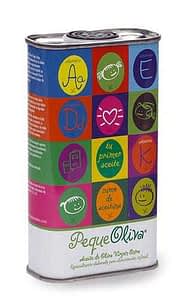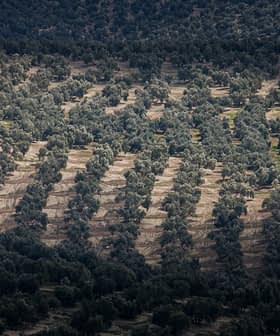
As dieticians and nutritionists continue to extol the various benefits of long-term olive oil consumption present in the Mediterranean diet, the Spanish Association of Pediatrics has taken this recommendation one step further by advocating the addition of 3 – 6 teaspoons of extra virgin olive oil in the food of infants as young as 6 months old.
 In response to this prescription, Spanish producer Vega Carabaña has filled this supply gap by launching its newest product, Peque Oliva– an extra virgin olive oil manufactured specifically for children. Peque Oliva olive oil contains no traces of chemicals or pesticides, boasts low levels of free fatty acidity (>0.2%) to allow for easy infant digestion and contains a higher oleic acid and polyphenol content than standard olive oils.
In response to this prescription, Spanish producer Vega Carabaña has filled this supply gap by launching its newest product, Peque Oliva– an extra virgin olive oil manufactured specifically for children. Peque Oliva olive oil contains no traces of chemicals or pesticides, boasts low levels of free fatty acidity (>0.2%) to allow for easy infant digestion and contains a higher oleic acid and polyphenol content than standard olive oils.
Peque Oliva is produced in the River Tajuña region located south of Madrid and is extracted from the olives from plantations with trees more than 100 years old. The company maintains that the maturity of these trees as well as extensive research on olive varieties and sustainable farming processes all contribute to an optimized production of an infant-friendly extra virgin olive oil with superior organoleptic properties.
Jose Cabrera Fernández, the business manager of Vega Carabaña, revealed that “fatherhood was the inspiration behind Peque Oliva.” He explained that “in Spain, there have been food products of all kinds adapted to the European regulations for infant consumption, but we found nothing in the market for infant olive oil. The regulations are very restrictive with respect to the levels of pesticides for infants and this gave us the drive to create the product.”
Fernández further disclosed that in order to produce the high-quality Peque Oliva oil suitable for children the company specifically “uses olives with the highest oleic acid content since their consumption does not contribute harmful levels of ‘bad’ cholesterol to an organism. This is why it is recommended for children who will undoubtedly have a high caloric intake due to their process of development.”
Infant cholesterol is a leading ailment among developing children as breast milk, the main source of energy during the first year of life is rich in cholesterol and saturated fat. Despite this, fats are extremely important to the development of infant children and are responsible for the growth of bones, the brain, and the eyes. The oleic acid content in Peque Oliva prevents cholesterol-based diseases by reducing the levels of LDL or “bad” cholesterol present in breast milk by replacing it with the HDL or “good” cholesterol contained in extra virgin olive oil. According to various researchers, extra virgin olive oil has shown to be an excellent substitute for the existing fats in breast milk.
The select Peque Oliva olives which contain these high levels of oleic acid are then put through a superior extraction method including, “an extra cold first press which guarantees that the vitamins and polyphenol properties of the olive are not lost.” These precious polyphenols and vitamins A, D, E, and K found in Peque Oliva have been shown to reduce the risk of cardiovascular disease and certain types of cancer while maintaining a balance in the immune systems of developing children.
Everything about the product seems to revolve around the child, although Peque Oliva olive oil may be consumed by anyone older than 6 months of age. The oil is bottled in a colorful, tin container that protects a child from possible glass injuries while simultaneously protecting the oil from adulterating factors like heat and light. Furthermore, the company Peque Oliva website explains how to convert the non-break olive oil cans into a child’s noise-making toy once empty and also suggests a number of nutritional recipes that specifically utilize Peque Oliva oil.
In terms of international marketing, Peque Oliva has already had success and significant exposure to a steadily emerging Asian market after winning two awards from this year’s International Food and Beverage Exhibition in China. Peque Oliva was a winner of this year’s “Trends & Innovations” contest, chosen among more than 1,300 exhibitors hailing from 76 countries. The brand continues to expand its international consumer base and is now available for purchase in England, Switzerland, France, Portugal, Spain and the United States.
Fernández confirmed that the public response to Peque Oliva has been an overwhelmingly positive one and that the medical community has also fully supported the distribution of Peque Oliva: “Pediatricians, who are certified health professionals and understand the technicalities behind the product, are accepting it extraordinarily well and are our biggest prescriptions. Although all new products generate some concerns, it is our job now to clear up any questions that might exist and explain that our product is exactly what it says it is.”
And perhaps this will be Peque Oliva’s biggest challenge – convincing consumers to shell out money for a high-end product during a time when Spanish olive oil prices have reached all-time lows due to a worldwide pricing crisis. With competition growing steadily as newly emerging producer countries begin to carve their stake into the worldwide olive oil sector, this may prove to be particularly difficult. A brief survey of online distributors quotes Peque Oliva’s 250 mL container of extra virgin olive oil as selling between $9 and $16 depending on where it is purchased.
Yet the managing director of the so-called, “world’s first olive oil for children” explains that the inherent added value of Peque Oliva is undeniably worth the extra cash: “The drop in the price of olive oil leads to, according to my understanding, a drop in the quality of the olive oil and our aim is not to do something cheap or inferior. We are here to offer a product which is both healthy and delicious at the same time.”
Mr. Fernández urges us to remember that with olive oil, perhaps more than any other food product, you get what you pay for.








